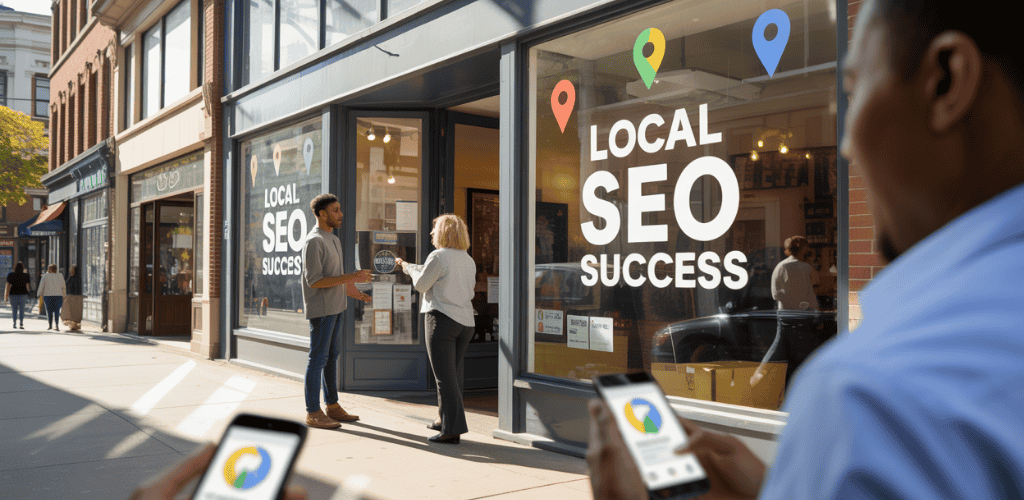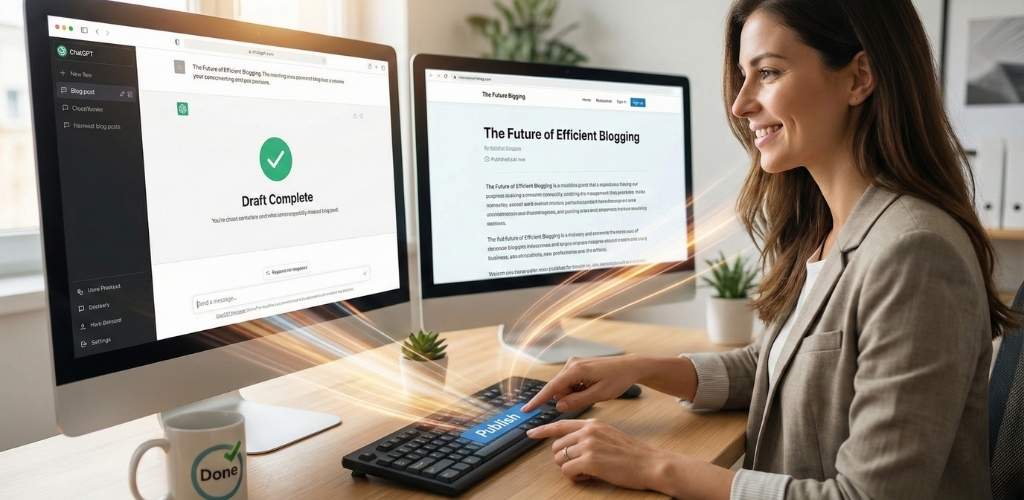Local search drives 46% of all Google searches, making local SEO a game-changer for small business owners who want customers to find them when they’re ready to buy. Your potential customers are searching for businesses “near me” every day, but if your small business isn’t showing up in those search results, you’re missing out on foot traffic and sales.
This guide covers 10 proven SEO tips for small business owners who need to compete with bigger companies in their local market. You’ll learn how to claim and optimize your Google My Business listing to appear in map results, build local citations that boost your credibility with search engines, and create location-specific content that actually ranks. We’ll also show you how to earn quality local backlinks and implement mobile optimization strategies that work for local searches.
These aren’t complicated tactics that require a marketing degree – they’re practical strategies you can start using today to get your business found by local customers searching online.
Table of Contents
Local SEO for Small Businesses
For small businesses looking to establish a strong online presence, local SEO represents one of the most powerful and cost-effective strategies available. Unlike traditional SEO that focuses on broad, national rankings, local SEO specifically targets customers in your immediate geographical area – the people most likely to visit your physical location or use your services. This targeted approach is particularly valuable for small businesses, as 76% of those who searched on their smartphones for something nearby visited a business within a day, and 28% of local searches resulted in a purchase.
The foundation of effective local SEO begins with understanding that search engines like Google prioritize businesses that provide comprehensive, accurate, and up-to-date information to potential customers. When implementing SEO tips for small business success, the focus should be on creating a robust local presence that builds trust and authority within your community.
Claim and Verify Your Business Listing
The cornerstone of any local SEO strategy is establishing a verified Google Business Profile (formerly Google My Business). This free tool serves as your business’s primary digital storefront and is often the first impression potential customers have of your company.
To get started, sign up for a Google Business Profile using your Google account. The verification process is crucial and involves multiple steps that Google uses to confirm your business’s legitimacy. Once you sign up, Google will ask you to verify your business through phone, text, email, and/or video. In many cases, Google will also conduct a review of your verification and send a notification once the process is complete.
This verification process is essential because it signals to Google that your business is legitimate and trustworthy. Verified businesses receive preferential treatment in local search results and are eligible for enhanced features like customer messaging, posts, and detailed analytics. The verification badge also builds consumer confidence, as potential customers are more likely to trust businesses that have been authenticated by Google.
Complete All Profile Sections with Accurate Information
After claiming and verifying your business listing, the next critical step involves completing every section of your profile with accurate, comprehensive information. Providing correct and comprehensive information about your business helps customers find and understand your business more effectively.
Essential information to include encompasses your complete business name, accurate address, phone number, website URL, business hours, and category selection. Your business description should clearly explain what you offer and include relevant keywords naturally. Additionally, ensure that your business hours are current and update them immediately during holidays or for special events.
Consistency is paramount across all online directories and platforms. Your business name, address, and phone number (NAP) should be identical everywhere it appears online. Even minor discrepancies, such as using “Street” instead of “St.” or including a suite number in one listing but not another, can confuse search engines and dilute your local SEO effectiveness.
Add High-Quality Photos and Regular Updates
Visual content plays a crucial role in local SEO success and customer engagement. Businesses with photos receive 42% more requests for directions on Google and 35% more clicks through to their websites compared to businesses without photos.
Upload high-quality images that showcase your business from multiple angles. Include exterior shots of your building, interior photos of your workspace or retail area, product images, and photos of your team in action. Ensure photos are well-lit, professional-looking, and accurately represent your business. Update your photos regularly to keep your profile fresh and engaging.
Beyond photos, utilize Google Business Profile’s posting feature to share updates, announcements, special offers, and events. These posts appear in your business listing and help demonstrate that your business is active and engaged with the community. Regular posting also provides additional opportunities to incorporate relevant keywords naturally while keeping your audience informed about your latest offerings.
Encourage and Respond to Customer Reviews
Customer reviews are among the most influential factors in local SEO rankings and consumer decision-making. Reviews serve as social proof and help build the trustworthiness component of Google’s E-A-T (Expertise, Authoritativeness, Trustworthiness) criteria.
Actively encourage satisfied customers to leave reviews by making the process as simple as possible. Provide direct links to your Google Business Profile review section, and consider following up with customers via email with gentle reminders about sharing their experience. Train your staff to naturally mention reviews during positive customer interactions.
Responding to reviews – both positive and negative – demonstrates your commitment to customer service and engagement. Thank customers for positive reviews and address any concerns raised in negative reviews professionally and constructively. This public dialogue shows potential customers that you value feedback and are dedicated to continuous improvement.
When responding to reviews, include relevant keywords naturally while maintaining authenticity. For example, a restaurant might thank a customer for praising their “authentic Italian cuisine” or “excellent customer service,” reinforcing these key terms associated with their business.
The implementation of these foundational local SEO strategies creates a strong base for small business online visibility. As we move forward in exploring additional local SEO tactics, remember that consistency, accuracy, and ongoing engagement are key to maximizing the effectiveness of these efforts.
Build Local Citations Across Online Directories

Local citations serve as the foundation of successful local search optimization, acting as digital breadcrumbs that help search engines understand your business’s legitimacy and location. These online references containing your business information play a crucial role in establishing trust and authority with search engines, ultimately improving your visibility in local search results.
Submit to major local directories and review sites
When implementing effective SEO tips for small business success, prioritizing major directory submissions creates immediate impact on your local search presence. Google My Business stands as the most critical starting point, as it directly feeds information to Google Search and Maps results. Beyond Google, focus on high-authority platforms that dominate local search ecosystems.
Yelp remains essential for most industries, particularly restaurants, healthcare, and service businesses, as it influences both consumer decisions and search rankings. Facebook Business Pages have gained significant importance, especially given Facebook’s integration with local search features and its massive user base for local discovery.
Apple Maps and Bing Places for Business deserve attention despite their smaller market share, as they serve specific demographics and contribute to overall citation consistency. Industry-agnostic platforms like Yellow Pages, Foursquare, and MapQuest continue providing valuable citation opportunities, while newer platforms like Nextdoor cater specifically to neighborhood-based businesses.
The key lies in understanding that these major directories often serve as data sources for smaller platforms, creating a cascading effect that amplifies your citation reach across the web. Prioritize platforms with high domain authority and active user engagement to maximize the impact of your citation-building efforts.
Ensure consistent NAP (Name, Address, Phone) information
NAP consistency represents one of the most fundamental yet frequently overlooked aspects of local SEO strategies. Search engines use NAP information as a primary signal for determining business legitimacy and location accuracy. Even minor inconsistencies can confuse search algorithms and diminish your local ranking potential.
Your business name must appear identically across all platforms, including legal designations, abbreviations, and punctuation. Avoid variations like “Smith & Sons” versus “Smith and Sons” or “ABC Co.” versus “ABC Company.” Establish a single, authoritative version and maintain it religiously across all citations.
Address formatting requires particular attention to detail. Use consistent abbreviations for street types (St. vs Street), directional indicators (N vs North), and suite numbers. Avoid post office boxes unless your business operates exclusively from that location, as search engines prioritize physical addresses for local relevance.
Phone numbers demand uniformity in formatting and functionality. Choose between formats like (555) 123-4567 or 555-123-4567 and maintain consistency. Ensure the number connects directly to your business location, not a call center or answering service, as this affects user experience and search engine evaluation.
Create a master NAP document that serves as your citation standard, including exact formatting preferences, and distribute it to team members responsible for online listings. This simple step prevents costly inconsistencies that can take months to correct across multiple platforms.
Target industry-specific directories
Industry-specific directories often provide higher-value citations than general platforms, as they demonstrate topical relevance and authority within your business sector. These specialized platforms typically attract more qualified traffic and carry additional weight with search engines due to their focused nature.
Healthcare professionals should prioritize directories like Healthgrades, WebMD, and Vitals, while legal professionals benefit from Avvo, Martindale-Hubbell, and FindLaw listings. Restaurants and food services gain significant value from OpenTable, Zomato, and TripAdvisor citations, which directly influence customer discovery and booking behavior.
Home service businesses find success with Angie’s List, HomeAdvisor, and Thumbtack, platforms that actively drive customer leads while building citation authority. Real estate professionals should focus on Zillow, Realtor.com, and local MLS-connected directories that potential clients frequently use for property searches.
Professional service providers benefit from Better Business Bureau listings, chamber of commerce directories, and professional association platforms specific to their credentials. These citations carry additional trust signals that influence both search rankings and customer confidence.
Research competitors’ citation profiles to identify industry-specific opportunities you may have overlooked. Tools like local citation audit services can reveal directories that frequently appear for businesses in your sector, providing a roadmap for strategic citation building that goes beyond obvious choices.
Monitor and update citations regularly
Citation maintenance requires ongoing attention as businesses evolve and platforms change their requirements. Regular monitoring prevents outdated information from negatively impacting your search rankings and customer experience, while proactive updates ensure maximum benefit from your citation investments.
Establish monthly citation audits using tools like Google Search Console and third-party citation tracking services. Search for your business name combined with old addresses or phone numbers to identify outdated listings that need correction. Set up Google Alerts for your business name to catch new citation opportunities and potential inconsistencies as they appear online.
Address changes require immediate citation updates across all platforms, as inconsistent location information can severely impact local search performance. Create a prioritized update list starting with major directories like Google My Business, Yelp, and Facebook, then systematically address smaller platforms over the following weeks.
Business hour changes, service area modifications, and contact information updates all necessitate citation maintenance. Seasonal businesses should pay particular attention to hour adjustments and service availability, as these factors directly influence customer experience and search engine understanding of business operations.
Document all citation locations in a spreadsheet including login credentials, last update dates, and platform-specific requirements. This organization streamlines future updates and prevents oversights that could compromise your local SEO efforts. Consider delegating citation management to specific team members while maintaining oversight through regular reporting and audit processes.
Create Location-Specific Content That Ranks

Now that we’ve established the foundation with local citations, creating compelling location-specific content becomes the driving force behind your local search visibility. When implementing SEO tips for small business, developing content that resonates with your local audience while targeting location-based keywords is essential for outranking competitors in your area.
Write about local events and news
Creating content around local happenings positions your business as an active community member while naturally incorporating location-based keywords. When you write about local events, festivals, or community news, you’re demonstrating to search engines that your business is geographically relevant to your target area.
Focus on events where your business participates or sponsors, seasonal celebrations specific to your region, or industry-related news affecting your local market. This approach ensures Google sees the desired information from its crawler’s location while providing valuable content that local customers actively search for. Include high-quality images near relevant text, such as photos from local events embedded within sections detailing your business’s involvement and community presence.
Develop neighborhood-focused service pages
Neighborhood-specific service pages represent one of the most effective SEO tips for small business owners looking to dominate local search results. These dedicated pages should focus on the unique needs and characteristics of each area you serve, creating compelling and useful content that is unique, easy-to-read, well organized, and up-to-date.
Structure these pages to include specific neighborhood names in your page titles, making results more useful for users searching in those areas. Address local pain points, highlight area-specific services, and include testimonials from customers in each neighborhood. This targeted approach helps search engines understand your service areas while providing valuable information to potential customers.
| Page Element | Neighborhood Focus Strategy |
|---|---|
| Page Title | Include neighborhood name + service |
| Headers | Use local landmarks and area names |
| Content | Address area-specific challenges |
| Images | Feature local business locations |
| Reviews | Highlight neighborhood customer testimonials |
Include local keywords naturally in content
Successful keyword integration requires anticipating your readers’ search terms while maintaining natural, readable content flow. Local keyword research should focus on how your community searches for services, including colloquial terms and local expressions unique to your area.
Incorporate location-based keywords throughout your content, including:
- Primary location keywords in page titles and headers
- Neighborhood-specific terms in body content
- Local landmark references when relevant
- Regional service variations that reflect local preferences
The key is ensuring these keywords enhance rather than disrupt the reader experience. Google’s sophisticated language matching systems can understand many queries, but strategic keyword placement still signals relevance to search engines.
Create location-based landing pages for multiple areas
For businesses serving multiple locations or neighborhoods, dedicated landing pages for each area maximize local search opportunities. These pages should contain different information depending on the user’s physical location while ensuring Google sees the desired information from its crawler’s location.
Each location page should feature:
- Unique service descriptions tailored to area demographics
- Location-specific contact information and addresses
- Area-focused testimonials and case studies
- Local business hours if they vary by location
- Neighborhood-specific offers or service variations
Remember to place high-quality images strategically throughout these pages, embedding photos of each location within sections detailing its description and service information. This visual content enhances user experience while providing additional context for search engines to understand your geographic relevance.
With this comprehensive approach to location-specific content creation, your small business can establish strong local search presence across multiple neighborhoods while providing genuine value to community members seeking your services.
Earn High-Quality Local Backlinks

Building high-quality local backlinks is a cornerstone of effective local SEO strategies that can significantly boost your small business’s search rankings and online authority. Search engines evaluate backlinks as an indicator of credibility and authority, making it essential to focus on acquiring links from trusted, relevant sources within your local community.
Partner with Local Businesses for Cross-Promotion
Strategic partnerships with complementary local businesses create mutually beneficial opportunities for local backlinks. Rather than competing directly, businesses can collaborate to strengthen their collective online presence while serving their shared customer base more effectively.
Start by identifying businesses that serve similar customers but offer different services. For example, a wedding photographer might partner with local florists, caterers, or venues. These partnerships can involve creating joint content, featuring each other’s services on websites, or developing resource pages that naturally include links to partner businesses.
When developing these partnerships, focus on creating genuine value for customers. Joint blog posts about local events, collaborative service packages, or shared educational content all provide natural opportunities for cross-linking. The key is ensuring that these links appear organic and provide real value to website visitors, as search engines prioritize authentic, helpful connections over artificial link schemes.
Sponsor Community Events and Organizations
Community sponsorship presents an excellent avenue for earning authoritative local backlinks while demonstrating your business’s commitment to the local area. Many community organizations, non-profits, and local events maintain websites where they acknowledge and link to their sponsors.
Research local chambers of commerce, business associations, charitable organizations, and community events that align with your business values and target audience. When you sponsor these organizations or events, they typically feature sponsor logos and links on their websites, providing valuable backlinks from established local entities.
The most effective sponsorships go beyond simple monetary contributions. Consider offering services, expertise, or resources that genuinely support the organization’s mission. This approach often results in more prominent placement on sponsor pages and may lead to additional mentions in newsletters, social media posts, and press releases.
Get Featured in Local News and Publications
Local media coverage represents one of the most valuable sources of local backlinks for small business SEO. Local newspapers, magazines, blogs, and online publications frequently seek interesting business stories, expert commentary, and community news.
Position yourself as a local expert in your field by regularly reaching out to journalists and editors with story ideas, expert insights, or commentary on industry trends. Many small business owners successfully secure media coverage by offering to discuss local economic impacts, seasonal business trends, or industry-specific topics relevant to their community.
Additionally, local news outlets often cover business openings, expansions, awards, and community involvement activities. Proactively sharing these newsworthy events with local media can result in coverage that includes links back to your website. The authority and trustworthiness of established media outlets make these backlinks particularly valuable for local search optimization.
Build Relationships with Local Influencers and Bloggers
Local influencers and bloggers represent an often-overlooked source of high-quality local backlinks. These individuals have established audiences within your geographic area and can provide targeted exposure to potential customers while offering valuable link opportunities.
Identify local food bloggers, lifestyle influencers, business writers, and community leaders who regularly create content about your area. Building authentic relationships with these content creators requires a genuine approach focused on mutual value rather than purely transactional link requests.
Consider inviting local bloggers to experience your products or services, participate in community events you sponsor, or collaborate on content that showcases local businesses or attractions. Many local influencers appreciate businesses that actively support community engagement and are willing to feature companies that demonstrate authentic local commitment.When reaching out to local content creators, personalize your approach and clearly articulate the value you can provide to their audience. Whether through exclusive access, expert insights, or unique local perspectives, successful collaborations result in natural, contextual links that benefit both parties while strengthening your local SEO for small business efforts.
Implement Local Schema Markup for Better Search Understanding

Implementing schema markup is one of the most effective SEO tips for small business owners looking to enhance their local search presence. Schema markup, also known as structured data, provides search engines with clear, organized information about your business, making it easier for them to understand and display your content in search results. This technical optimization can significantly improve your visibility in local search results and help your small business stand out from competitors.
Add LocalBusiness Structured Data to Your Website
LocalBusiness schema markup serves as the foundation of your local SEO strategy, acting as a digital business card that communicates essential information directly to search engines. This structured data type tells Google, Bing, and other search engines exactly what your business is, where it’s located, and what services you offer.
When implementing LocalBusiness schema, focus on including core business information such as your business name, address, phone number, website URL, and business category. The structured data should also include your business hours, payment methods accepted, and areas served. This comprehensive approach ensures search engines have all the necessary information to display your business accurately in local search results.
Valid structured data makes your pages eligible for special features in Google Search results, including enhanced business listings that can display directly in search results. Small businesses that properly implement LocalBusiness schema often see improved click-through rates because their listings appear more prominent and informative than competitors without structured markup.
Include Location-Specific Schema on Service Pages
Now that we’ve covered the foundational LocalBusiness markup, location-specific schema becomes crucial for businesses serving multiple areas or offering services at different locations. Service pages benefit tremendously from location-specific structured data that tells search engines exactly which geographic areas each service covers.
For small businesses offering services across different neighborhoods, cities, or regions, implementing Service schema with geographic modifiers helps search engines match your content with location-based queries. This markup should include the specific service name, description, service area, and pricing information when applicable.
Location-specific schema also supports businesses with multiple physical locations. Each location should have its own structured data implementation, ensuring search engines can properly categorize and display each location in relevant local searches. This approach is particularly valuable for franchise businesses or companies with multiple storefronts serving different communities.
Mark Up Your Business Hours and Contact Information
Business hours and contact information represent critical touchpoints for local customers, making their proper markup essential for local SEO success. OpeningHoursSpecification schema provides a standardized way to communicate when your business is open, including regular hours, holiday schedules, and seasonal variations.
Properly marked-up business hours can appear directly in search results, Google My Business listings, and voice search responses. This immediate visibility helps potential customers determine if your business is currently open without needing to visit your website, improving user experience and increasing the likelihood of customer visits.
Contact information markup should extend beyond basic phone numbers to include different contact methods such as customer service lines, emergency numbers, and department-specific contacts. Email addresses, social media profiles, and preferred contact methods can also be included in the structured data to provide comprehensive communication options for potential customers.
Use Review Schema to Display Star Ratings
Review schema markup represents one of the most visually impactful applications of structured data for small businesses. When properly implemented, review markup can display star ratings directly in search results, creating eye-catching listings that significantly improve click-through rates compared to standard search results.
The review schema should aggregate ratings from legitimate review sources, displaying average ratings, total number of reviews, and recent review dates. This information helps build trust with potential customers before they even visit your website. Search engines use this structured data to create rich snippets that make your business listings more prominent and attractive in search results.
Review schema can influence elements like breadcrumbs in search results, creating a more comprehensive and professional appearance for your business listings. Small businesses that consistently implement review markup alongside active reputation management strategies often see improved local search rankings and increased customer engagement.
Valid structured data implementation requires attention to technical details and regular maintenance to ensure accuracy. Small businesses should regularly audit their schema markup to verify that all information remains current and properly formatted, as outdated or incorrect structured data can negatively impact search performance.
Optimize for Mobile and Voice Search

With local search behaviors rapidly evolving, optimizing for mobile and voice search has become a critical component of local SEO strategies. The majority of local searches now happen on mobile devices, and voice search is increasingly shaping how consumers discover local businesses. For small business SEO tips to be effective in today’s landscape, they must address these shifting search patterns.
Ensure Fast Loading Times on Mobile Devices
Mobile SEO for local business starts with speed optimization. Page loading speed directly impacts your local search rankings and user experience. Google’s mobile-first indexing means that your mobile site performance is the primary factor in determining your search visibility.
Target a loading time of under three seconds for optimal mobile performance. Compress images without sacrificing quality, minimize HTTP requests, and leverage browser caching to improve load times. Enable AMP (Accelerated Mobile Pages) for content-heavy pages to ensure lightning-fast loading on mobile devices.
Optimize your website’s code by minifying CSS, JavaScript, and HTML files. Remove unnecessary plugins and widgets that could slow down your mobile site. Consider using a content delivery network (CDN) to serve your content from servers closest to your users’ geographic locations, which is particularly beneficial for location-based SEO.
Test your mobile site speed regularly using tools like Google PageSpeed Insights or GTmetrix. Monitor Core Web Vitals metrics including Largest Contentful Paint (LCP), First Input Delay (FID), and Cumulative Layout Shift (CLS) to ensure your mobile experience meets Google’s standards for local search optimization.
Create Content That Answers Conversational Queries
Voice search optimization requires a fundamental shift in how you approach content creation. Voice queries tend to be longer, more conversational, and question-based compared to traditional text searches. This evolution demands content that mirrors natural speech patterns and directly answers specific questions.
Develop FAQ sections that address common customer questions using natural language. Focus on long-tail keywords that reflect how people actually speak when asking questions about your products or services. For example, instead of optimizing for “pizza restaurant,” create content answering “Where can I find the best pizza near me tonight?”
Structure your content to provide immediate, concise answers to voice queries. Use clear headings and bullet points that voice assistants can easily extract and read aloud. Create content clusters around local topics that address the complete customer journey, from awareness to purchase decisions.
Incorporate question phrases like “how to,” “what is,” “where can I,” and “when does” into your content naturally. These conversational triggers align with voice search patterns and improve your chances of appearing in featured snippets and voice search results.
Optimize for “Near Me” Searches
“Near me” searches represent a massive opportunity for local businesses to capture high-intent customers. These searches have grown exponentially and often lead to immediate actions like store visits or phone calls.
Ensure your Google My Business profile is completely optimized with accurate location information, business hours, and contact details. This optimization is crucial for appearing in “near me” search results and local map packs.
Create location-specific landing pages that incorporate “near me” variations naturally within the content. Include your city, neighborhood, and surrounding areas in your content while maintaining readability and relevance. Use local landmarks and geographic references that people commonly use when searching for businesses in your area.
Implement local schema markup to help search engines understand your business location and service areas. This structured data increases your visibility in location-based search results and enhances your chances of appearing in local search features.
Develop content around local events, news, and community activities that naturally incorporate location-specific terms. This approach helps establish topical authority for your geographic area and improves your relevance for location-based SEO.
Use Natural Language in Your Content
Natural language optimization is essential for voice search optimization and modern SEO success. Search engines have become increasingly sophisticated at understanding conversational queries and context, making natural language a crucial ranking factor.
Write content as if you’re having a conversation with your customers. Use contractions, colloquialisms, and the same language your target audience uses when discussing your products or services. This approach improves user engagement and aligns with voice search query patterns.
Incorporate local dialect and regional terminology that your community uses. This localization helps your content resonate with local audiences and improves relevance for local search optimization. Include industry-specific terms that customers might use when speaking about your services, not just technical jargon.
Structure sentences and paragraphs to flow naturally when read aloud. Voice assistants often pull content directly from web pages, so content that sounds natural when spoken has a better chance of being selected for voice search results.
Balance keyword optimization with natural language flow. While keywords remain important for local SEO for small business success, they should integrate seamlessly into conversational content that provides genuine value to users seeking local solutions.
Leverage Social Media for Local Engagement

Social media platforms have become indispensable tools for local SEO strategies and small business visibility. When executed effectively, social media can significantly amplify your local search optimization efforts while building meaningful connections with your community. Now that we have covered the technical aspects of local SEO, let’s explore how social media can serve as a powerful vehicle for local engagement and search ranking improvements.
Post Regularly About Local Happenings and Involvement
Consistent posting about local events, community initiatives, and your business’s involvement in neighborhood activities creates a strong foundation for location-based SEO. This approach not only demonstrates your business’s connection to the local community but also generates content that resonates with local search algorithms.
When you promote new content through social media that highlights local happenings, you’re creating valuable signals for search engines about your business’s geographical relevance. Share posts about local festivals, community fundraisers, seasonal events, or municipal developments that affect your area. This type of content naturally incorporates location-specific keywords that enhance your small business SEO efforts.
Consider documenting your participation in local chamber of commerce events, sponsorships of youth sports teams, or partnerships with other local businesses. These posts serve dual purposes: they showcase your community involvement while creating content that search engines recognize as locally relevant. Regular posting about such activities helps establish your business as an integral part of the local ecosystem.
Use Location Tags and Local Hashtags
Strategic implementation of location tags and local hashtags transforms your social media posts into powerful local search signals. Every post should include your city, neighborhood, or region in hashtags such as #YourCitySmallBusiness or #YourNeighborhoodName. This practice directly supports your local SEO for small business objectives by creating consistent geographical markers across your social media presence.
Location tagging on platforms like Instagram and Facebook provides additional context to search engines about your business’s physical presence and service area. When you tag your actual business location or nearby landmarks, you’re reinforcing the local citations that are crucial for local search optimization. This consistency between your social media location data and your Google My Business information strengthens your overall local SEO strategy.
Local hashtags should extend beyond just your city name to include neighborhood-specific tags, regional identifiers, and local slang or terminology that residents use. For example, if you’re in Chicago, you might use #ChiTown, #WindyCity, or specific neighborhood tags like #LoganSquare alongside more formal location identifiers.
Engage with Local Community Groups and Pages
Active engagement with communities represents one of the most effective ways to build and engage your audience while boosting local search visibility. Following and participating in local Facebook groups, neighborhood associations, business networks, and community forums creates valuable networking opportunities and increases your business’s local online footprint.
When you engage with communities through meaningful comments, shares, and collaborative posts, you’re building relationships that often translate into natural backlinks and mentions—both crucial components of local backlink strategies. Participate authentically in discussions about local issues, offer helpful advice related to your expertise, and share relevant resources with community members.
This engagement strategy extends to interactions with other local businesses, municipal pages, and community organizations. When you consistently engage with local content, social media algorithms recognize these interaction patterns and are more likely to show your content to other users in your geographical area, effectively expanding your local reach.
Share Customer Testimonials and Local Success Stories
Customer testimonials and local success stories provide authentic social proof while reinforcing your business’s connection to the community. These posts naturally incorporate location-specific details and demonstrate your business’s positive impact on local customers, which search engines value for local ranking factors.
When sharing testimonials, include details about the customer’s location (with permission), the specific problem you solved, and how your solution benefited them within the local context. For instance, a plumbing business might share a story about helping a family in a specific neighborhood during a winter emergency, naturally incorporating local landmarks and community references.
Local success stories should highlight projects, services, or achievements that have community-wide impact. Whether it’s a successful event you catered, a home renovation that transformed a neighborhood property, or a service that helped a local nonprofit, these stories create content that resonates with local search intent while building credibility.
Consider offline promotion strategies such as listing your website’s URL on business cards, letterhead, and other materials, then encourage customers to share their experiences on social media. This integrated approach between offline and online promotion creates multiple touchpoints for local engagement while supporting your overall local SEO for small business strategy.
The key to successful social media local engagement lies in authenticity and consistency. Regular interaction with your local community through social media creates a network effect that extends far beyond individual posts, establishing your business as a recognized and trusted local authority in your field.
Monitor and Track Your Local SEO Performance

Now that we have covered the essential local SEO strategies for implementation, it’s crucial to understand how to measure their effectiveness. Monitoring and tracking your local SEO performance ensures that your small business SEO tips are generating tangible results and helps identify areas for improvement in your location-based SEO efforts.
Set up Google Search Console for local insights
Google Search Console serves as your primary dashboard for understanding how Google views and ranks your website in local search results. To maximize your local SEO for small business, start by creating a Google account and adding your website to Search Console. This process requires verifying that you are the site’s owner, as the platform will display confidential information and allow you to make changes that impact how your site appears in Google search results.
Once your account is established, familiarize yourself with Search Console and Google Search functionalities. Google provides comprehensive guides to help you understand the reports and data that Search Console generates, which is essential for effective local search optimization. The URL Inspection Tool within Search Console allows you to check exactly how Google sees your pages, providing valuable insights into your local SEO strategies performance.
To maintain optimal performance, check your Search Console dashboard monthly and whenever you add new content to your site. While Google sends email alerts for unusual events that might indicate problems like hacking, regular monthly reviews serve as a health check for your website’s local SEO performance. This consistent monitoring approach ensures that any issues affecting your local search visibility are identified and addressed promptly.
Track local keyword rankings and visibility
Effective tracking of local keyword rankings requires patience and consistency. After implementing changes to improve your local SEO for small business, wait several weeks to assess their beneficial effects in Google Search results. This waiting period is essential because search engine algorithms need time to crawl, index, and evaluate your optimized content.
Focus on monitoring keywords that include location-specific terms relevant to your business area. Track how your website performs for searches that combine your services with local identifiers, as these represent the core of local search optimization. Regular monitoring helps you understand which local SEO strategies are driving the most significant improvements in your search visibility.
Document your rankings over time to identify trends and patterns in your local search performance. This data becomes invaluable when making strategic decisions about future content creation and optimization efforts for your small business SEO.
Monitor online reviews and reputation
Your online reputation directly impacts your local search rankings and customer acquisition. Monitoring reviews across multiple platforms provides insights into how customers perceive your business and affects your local SEO performance. Positive reviews not only improve your search rankings but also increase the likelihood of potential customers choosing your business over competitors.
Implement a systematic approach to tracking reviews on Google My Business, Yelp, Facebook, and industry-specific review platforms. Respond promptly and professionally to all reviews, as engagement demonstrates to both customers and search engines that you actively manage your online presence.
Analyze competitor local SEO strategies
Understanding your competitors’ local SEO approaches provides valuable insights for improving your own strategies. Analyze how competitor businesses in your area optimize their Google My Business profiles, structure their location-based content, and engage with local customers online.
Examine their keyword strategies, content creation frequency, and local citation patterns. This competitive analysis helps identify gaps in your current local SEO strategies and reveals opportunities for improvement. Pay attention to how competitors handle mobile SEO for local business and voice search optimization, as these factors increasingly influence local search rankings.
Regular competitor analysis ensures your local SEO efforts remain competitive and aligned with current market trends, helping maintain your visibility in local search results.
Seo Tips for Small Business

Why SEO Important for Business
Search engine optimization represents a fundamental shift in how small businesses can compete in today’s digital marketplace. With over 53.3% of all website traffic originating from organic searches and 90.55% of global traffic flowing through Google Search, Google Images, and Google Maps, SEO has become an indispensable tool for small business growth and visibility.
The importance of SEO for small businesses extends far beyond simple online presence. It serves as a cost-effective marketing strategy that levels the playing field against larger competitors. Unlike traditional advertising methods that require substantial ongoing investment, local SEO for small business offers a sustainable approach to attracting customers without breaking the bank. This accessibility makes SEO particularly valuable for small business owners who need to maximize their marketing budget while achieving meaningful results.
One of the most compelling reasons why SEO matters for businesses lies in consumer behavior patterns. Research indicates that only 0.63% of Google Search users click on results from the second page, making first-page rankings crucial for visibility. This statistic underscores the critical importance of implementing effective small business SEO tips to secure prominent search positions. When potential customers search for products or services, they rarely venture beyond the first page of results, making top rankings essential for business discovery.
The direct impact on web traffic represents another vital aspect of SEO importance. Increased visibility in search results naturally leads to more website visitors, which can translate into higher foot traffic for brick-and-mortar locations. This dual benefit makes local search optimization particularly powerful for businesses with physical storefronts. The connection between online visibility and real-world customer visits demonstrates how SEO bridges the gap between digital marketing and tangible business outcomes.
SEO also significantly enhances user experience, which has become a ranking factor for search engines. When businesses optimize their websites for search engines, they simultaneously improve navigation, loading speeds, and content organization. These improvements benefit both search engine algorithms and human visitors, creating a positive feedback loop that reinforces higher rankings while providing better customer experiences.
Trust and credibility represent additional benefits that small businesses gain from strong SEO performance. Websites that appear prominently in search results are often perceived as more authoritative and trustworthy by consumers. This perceived authority stems from the association between high search rankings and business legitimacy, making SEO an important component of brand building and reputation management.
The long-term value proposition of SEO makes it particularly attractive for small businesses focused on sustainable growth. Unlike paid advertising that stops generating results when the budget runs out, organic search rankings can continue driving traffic for months or years after the initial optimization work. This enduring impact provides exceptional return on investment, especially when compared to other marketing channels that require continuous funding.
Voice search optimization and mobile SEO for local business have become increasingly important as consumer search behaviors evolve. With more people using smartphones to find nearby businesses, local SEO strategies that address these trends help small businesses capture customers at the moment of intent, when they’re ready to make purchasing decisions.
Seo Tips for Website

Now that we’ve covered the local SEO strategies that can significantly boost your small business visibility, let’s examine essential website optimization techniques that form the foundation of any successful search engine optimization campaign. Your website serves as the digital storefront for your business, and implementing the right SEO practices can dramatically improve your search rankings and attract more potential customers.
The foundation of effective website SEO begins with optimizing your on-page elements, which are the different components of your website that search engines evaluate when determining rankings. Page URLs should be simple, short, and contain relevant keywords that accurately describe your content. When crafting URLs, avoid complex strings of numbers or irrelevant characters, instead opting for clean, descriptive paths that both users and search engines can easily understand.
Page titles, also referred to as title tags, serve as one of the most critical ranking factors for search engines. These titles indicate to visitors and search engines what each page is about, making it essential to include your main keyword for each page within the title. Craft compelling titles that not only incorporate your target keywords but also entice users to click through to your website from search results.
Headers, commonly called body tags, play a crucial role in organizing and structuring your page content for both readers and search engines. These headers should be relevant to your content and include keywords when appropriate, helping to create a logical hierarchy that guides users through your information while signaling to search engines the importance of different sections.
Alt text for images represents another often-overlooked optimization opportunity that can significantly impact your SEO performance. Adding descriptive alt text to images helps search engines understand what your visual content represents, while also supporting accessibility for users with screen readers. This practice contributes to better overall site optimization and can help your images appear in relevant image search results.
Meta descriptions appear underneath page titles in search engine results and serve as your opportunity to provide a compelling summary of your content. These descriptions should accurately describe your page while enticing users to click through, making them an ideal location to include relevant keywords naturally. Well-crafted meta descriptions can significantly improve your click-through rates from search results.
Content optimization extends beyond just including keywords throughout your text and alt text. SEO-optimized content incorporates relevant keywords naturally while providing genuine value to your audience. Images, videos, and other visual content also contribute to SEO ranking by making your content more scannable and enhancing your website’s visual appeal, which can lead to longer user engagement times.
Search engines evaluate websites based on expertise, experience, authoritativeness, and trustworthiness criteria. Demonstrating expertise through detailed bios and credentials, showcasing experience with photos and real-life examples, establishing authoritativeness through quality backlinks and regular content updates, and building trustworthiness through transparent citing and accurate information all contribute to improved search rankings.
SEO Tips for Blogger
Previously, we’ve discussed general website optimization, but bloggers face unique challenges and opportunities in the SEO landscape that require specialized approaches. Blog content offers exceptional opportunities for keyword optimization and long-form content creation that can attract organic traffic over extended periods.
When optimizing blog posts for search engines, focus on creating comprehensive, high-quality content that thoroughly addresses your target topics. Break up long sections of text with relevant headers and organize information into sections and lists to make content easy to read, understand, and scan. This approach not only improves user experience but also helps search engines better understand and index your content structure.
Keyword integration in blog posts should feel natural and provide genuine value to readers rather than appearing forced or repetitive. Include your target keywords in strategic locations such as page titles, headers, meta descriptions, and naturally throughout your body paragraphs. However, avoid keyword stuffing, which can negatively impact your search rankings and create poor user experience.
Internal link building becomes particularly important for bloggers, as it involves including links to other pages within your website. This practice offers a good experience to users by providing additional relevant information while demonstrating to search engines that your website has proper hierarchy and structure. Strategic internal linking can help distribute page authority throughout your site and keep visitors engaged longer.
Blog content also provides excellent opportunities for external link building, as high-quality, informative blog posts naturally attract backlinks from other websites. Creating valuable content and sharing it with people who might find it interesting can lead to organic link building opportunities that significantly boost your search authority.
With this in mind, consistency in publishing new content plays a vital role in blog SEO success. Search engines favor websites that regularly publish fresh, relevant content, and maintaining a consistent posting schedule helps establish your site as an authoritative source in your industry. Regular content updates also provide more opportunities to target different keywords and capture long-tail search queries that your audience might use.
FAQ’s
Now that we’ve covered the comprehensive local SEO strategies that can transform your small business visibility, let’s address the most frequently asked questions about SEO fundamentals and local search optimization.
What are the 4 pillars of SEO?
The four pillars of SEO form the foundation of any successful search engine optimization strategy, particularly crucial for local SEO for small business success:
Technical SEO serves as the structural foundation, ensuring your website loads quickly, is mobile-friendly, and provides excellent user experience. For local businesses, this includes proper implementation of local schema markup and ensuring your site performs well on mobile devices where most local searches occur.
Content SEO focuses on creating valuable, relevant content that addresses your audience’s needs. For local search optimization, this means developing location-specific content that resonates with your community and incorporates relevant local SEO strategies.
On-Page SEO involves optimizing individual web pages for specific keywords and search intent. Local businesses must optimize title tags, meta descriptions, and headers with location-based keywords while maintaining natural language flow.Off-Page SEO encompasses activities outside your website that build authority and trust. For local businesses, this primarily involves building local citations, earning local backlinks, and managing your online reputation across various platforms.
What is SEO for small businesses?
SEO for small businesses is a specialized approach to search engine optimization that focuses on helping local companies compete effectively in their geographic markets. Unlike enterprise SEO, small business SEO tips emphasize cost-effective strategies that deliver measurable results within limited budgets.
Local SEO for small business prioritizes visibility in local search results, particularly the coveted “local pack” that appears when users search for businesses “near me” or include location modifiers. This involves comprehensive Google My Business optimization, ensuring accurate business information across online directories, and building a strong local online presence.
Small business SEO strategies typically focus on long-tail keywords with local intent, as these are less competitive and more likely to convert. The approach emphasizes quality over quantity, targeting specific geographic areas where the business operates rather than competing nationally.
How to get 100% SEO?
While achieving “100% SEO” isn’t a realistic goal—SEO is an ongoing process rather than a destination—you can maximize your optimization efforts through comprehensive local SEO strategies:
Complete Technical Optimization ensures your website meets all search engine requirements, including fast loading speeds, mobile responsiveness, secure HTTPS connection, and proper site architecture. For local businesses, this includes implementing location-based SEO elements like local schema markup.
Comprehensive Content Strategy involves creating high-quality, relevant content that addresses every stage of your customer’s journey. This includes local landing pages, location-specific blog posts, and content that incorporates voice search optimization principles.
Authority Building through consistent local citations, high-quality local backlinks, and positive customer reviews establishes your business as a trusted local authority in your industry.Ongoing Monitoring and Optimization using analytics tools to track performance, identify opportunities, and continuously refine your mobile SEO for local business strategy.
What are the 3 C’s of SEO?
The 3 C’s of SEO represent fundamental principles that guide effective optimization strategies, particularly relevant for local businesses:
Content remains the cornerstone of SEO success. For local businesses, this means creating valuable, location-specific content that addresses local customer needs and incorporates relevant keywords naturally. Quality content builds trust with both search engines and potential customers.
Code refers to the technical aspects of your website, including clean HTML structure, proper meta tags, schema markup, and fast loading speeds. Local businesses must ensure their technical foundation supports local search optimization goals.Credibility encompasses factors that establish your business as trustworthy and authoritative. This includes earning quality backlinks, maintaining consistent NAP (Name, Address, Phone) information across directories, collecting positive reviews, and building a strong local online reputation.
What are the 4 types of SEO?
Understanding the four primary types of SEO helps local businesses develop comprehensive optimization strategies:
White Hat SEO involves ethical practices that align with search engine guidelines. For local businesses, this includes legitimate local citations, organic link building, and creating genuine value for customers through quality content and services.
Black Hat SEO uses manipulative tactics that violate search engine guidelines and should be avoided. These practices can result in penalties that severely damage your local search visibility.
Gray Hat SEO falls between white and black hat techniques, involving practices that aren’t explicitly prohibited but carry risk. Local businesses should focus primarily on white hat strategies for sustainable growth.Negative SEO refers to malicious attempts to harm competitors’ rankings. While awareness is important, local businesses should focus their energy on positive optimization rather than competitive sabotage.
What is the golden triangle of SEO?
The golden triangle of SEO represents the critical intersection of three essential elements that determine search success:
Relevance ensures your content matches what users are searching for. For local businesses, this means aligning your content with local search intent and incorporating local SEO strategies that address community-specific needs and interests.
Authority establishes your website’s trustworthiness and expertise in your field. Local businesses build authority through consistent local citations, earning quality local backlinks from reputable local sources, and maintaining positive customer relationships reflected in reviews and testimonials.
User Experience encompasses how visitors interact with your website, including page load speed, mobile responsiveness, navigation ease, and content accessibility. With most local searches occurring on mobile devices, mobile SEO for local business becomes particularly crucial in the golden triangle framework.
When these three elements work harmoniously, they create the optimal conditions for search engine visibility and user satisfaction, leading to improved local search rankings and increased customer acquisition for small businesses.
Conclusion
Implementing these 10 local SEO strategies will significantly enhance your small business’s visibility in local search results. From building consistent local citations and creating location-specific content to optimizing for mobile and voice search, each strategy works together to strengthen your online presence. Remember that local SEO is not a one-time effort—it requires ongoing attention to monitoring performance, maintaining accurate business information, and staying engaged with your local community through social media and quality content.
The foundation of successful local SEO lies in understanding that search engines want to help users find the most relevant local businesses for their needs. By following these proven strategies and consistently applying best practices, you’ll position your business to compete effectively in your local market. Start with the basics like claiming your Google Business Profile and building citations, then gradually implement the more advanced techniques. With patience and persistence, you’ll see your small business climb the local search rankings and attract more qualified customers from your community.








